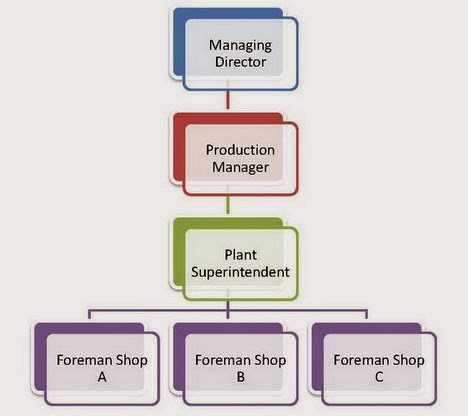This article is about the level of management which is classified into three parts, i.e. top, middle and lower.
(You can check out my blog on
https://bizmgnt.blogspot.com/ )
Concept of Level of Management
Level of management refers to the process of dividing the authority and responsibility of the organization among the various managerial positions. In this regard E.F.L. Brech divides the management into three levels in which different managerial functions are to be performed by different managerial position holders who are named differently in different levels. Their authorities and responsibilities are differently, however, they all perform well, effectively, efficiently and coordinately the corporate goals surely be achieved. According the levels are top level management, middle level management and lower level or first line level management. All the managers, separately as well as coordinately perform the functions of planning, organizing, staffing, leading, motivation, supervising and controlling.
For the convenience of study, these levels can be illustrated and classified in the following manners and the managerial authority and responsibilities can be studied at the same time.
Following headings are the classification of level of management
Top Level Management
Top level management is related to develop attitude and is concerned with the broad policy framework. It involves Board of Directors, Chairman, Managing Chief, Strategist and alike. They are responsible for the welfare and survival of the organizations. Here, in this level, the corporate goals, missions and objectives are determined and a detailed action plan and strategies for the same are formulated. This level is the ultimate source of authority which are found being delegated to lower part of the organizations.
The important functions of this level are given below:
-to formulate and determine the objectives of the business
-to set up an organizational structure to conduct the operations as per the plans
-to judge and evaluate the results
-to control effectively the business operations
-to establish policies and prepare plans to attain the goals
-to assemble the resources necessary for the attainment of the policy and execution of the plan.
Middle Level Management
Middle level management consists of departments, divisions and sections, in which the respective chiefs, heads or managers are considered with the task of implementing the policies and plans prepared by the top level management. Virtually, they are the real subordinates to top managers. Being in the middle, the managers have to perform as per the directives given by the top managers and take responsibility for the performance of the first line method. In overall management, this level is considered as the bridge between first line management and top level management. The managers have to take the responsibility of implementation and control of plans and policies and help the organization to conduct the business an per the strategies set by the top.
The main functions of this level are pointed below:
-to implement the task given by top level management
-to provide the instruction to first line management
-to play the role of bridge between top and first line management
-to run the organization effectively and efficiently
-to lead the department and build-up an organizational spirit
-to report and make suitable recommendations to the top level management for the better execution of the plans and policies
-to motivate the workers and staffs for higher productivity and to reward them properly.
Lower Lever or First Line Management
Lastly, the first line or lower level management is also known as supervisory level of management in which the supervisors and foreman and others like sales officers, account officers etc. take responsibilities of the implementation and control of the operational plans developed by the middle level managers. It clears that the actual operations are performed here. This level is concerned with the actual implementation and control of operational plans.
The basic functions of this level can be described as:
-to issue the orders and instructions to the workers
-to supervise and control the performance
to plan the activities of the sections
-to provide on the job training to the workers
-to direct and guide the workers about the work procedures
-to solve the problems of workers
-to develop sense of cooperation and high group spirit among the workers
to inform the unsolved problems of the workers to the middle level management.
If your find this article helpful then please let me know through comment and if you want any other information related to this topic then please comment. And also you can visit my https://bizmgnt.blogspot.com/to know more about related topic.




Comments
Post a Comment